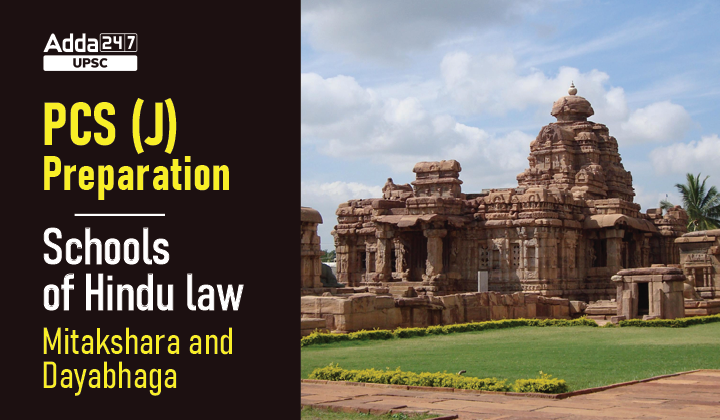Table of Contents
Schools of Hindu law
The oldest law in the world is Hindu Law. Hindu law was initially developed to meet all of the needs of the populace and promote their welfare. The Shruti (God’s words), Smriti (text), customs (previous traditions), commentaries, and digests serve as the foundation for Hindu law.
Modern Hindu law is divided into two categories: codified law and uncodified law. Every Hindu is governed by codified law. However, uncodified Hindu Law contains the ideas of the schools of Hindu law, which are not found in codified law. Many academics from all over India authored commentaries on the Vedas and Smritis, which served as the foundation for the many schools of Hindu law.
As the Smriti evolved, different commentators and interpreters’ perspectives diverged. While different codes were created, there was no supreme body of law. An authority may be fully recognised in one region of India and completely rejected in another. People who embraced one authority were probably not going to accept another. As a result, various schools of thought developed.
The following are the two main schools of Hindu law:
- Mitakshara
- Dayabhaga
In terms of Hindu law, what is Mitakshara School?
The Vijnaneshwara Commentary gave its name to the Hindu system of law known as Mitakshara. All of India is affected, with the exception of Bengal and Assam. Additionally, it governs all issues on which the Dayabhaga School of Law is quiet in Bengal and Assam.
- In terms of the rule of succession, Mitakshara is based on the idea of propinquity, or the closest blood relative. It is based on agnates over cognates and eliminates females from inheritance.
- According to the Mitakshara School, sons have a title to the joint Hindu family property by birth, and each coparcener’s interest fluctuates because birth and death can increase or decrease it. Additionally, neither the father nor any other co-parent has the authority to sell or otherwise dispose of common family assets.
हिंदू कानून के संदर्भ में, मिताक्षरा स्कूल क्या है?
विजनेश्वर भाष्य ने अपना नाम हिंदू कानून व्यवस्था को दिया जिसे मिताक्षरा के नाम से जाना जाता है। बंगाल और असम को छोड़कर पूरा भारत प्रभावित है। इसके अतिरिक्त, यह उन सभी मुद्दों को नियंत्रित करता है जिन पर बंगाल और असम में दयाभागा स्कूल ऑफ लॉ शांत है।
- उत्तराधिकार के नियम के संदर्भ में, मिताक्षरा प्रायिकता, या निकटतम रक्त रिश्तेदार के विचार पर आधारित है। यह संज्ञेय पर agnates पर आधारित है और महिलाओं को वंशानुक्रम से समाप्त करता है।
- मिताक्षरा विचारधारा के अनुसार, पुत्रों का जन्म से संयुक्त हिंदू परिवार की संपत्ति में एक शीर्षक होता है, और प्रत्येक सहदायिक के हित में उतार-चढ़ाव होता है क्योंकि जन्म और मृत्यु इसे बढ़ा या घटा सकते हैं। इसके अतिरिक्त, न तो पिता और न ही किसी अन्य सह-माता-पिता को सामान्य पारिवारिक संपत्ति को बेचने या अन्यथा निपटाने का अधिकार है।
What Does the Hindu Law Say About Dayabhaga School?
The Dayabhaga School, which derives its name from the Jimutavahana summary, is another important school of Hindu law. It is prevalent in Bengal and Assam and only addresses inheritance and partition.
- The Dayabhaga School does not establish agnates over cognates and is founded on the ideas of religious efficacy and spiritual benefit. No such birthright in terms of succession is granted to the son under this school of law.
- The joint family property also has a definite and determined part, and interest does not change with birth or death. Contrary to the Mitakshara School of Law, the coparcener has the complete authority to alienate his undivided portion in a joint family property.
हिंदू कानून दयाभागा स्कूल के बारे में क्या कहता है?
दयाभाग स्कूल, जिसका नाम जिमुतवाहन सारांश से लिया गया है, हिंदू कानून का एक और महत्वपूर्ण स्कूल है। यह बंगाल और असम में प्रचलित है और केवल विरासत और विभाजन को संबोधित करता है।
- दयाभाग विचारधारा संज्ञेय पर अग्नेत स्थापित नहीं करती है और धार्मिक प्रभावोत्पादकता और आध्यात्मिक लाभ के विचारों पर आधारित है। इस स्कूल ऑफ लॉ के तहत बेटे को उत्तराधिकार के मामले में ऐसा कोई जन्मसिद्ध अधिकार नहीं दिया गया है।
- संयुक्त परिवार की संपत्ति का भी एक निश्चित और निर्धारित हिस्सा होता है, और ब्याज जन्म या मृत्यु के साथ नहीं बदलता है। मिताक्षरा स्कूल ऑफ लॉ के विपरीत, सहदायिक के पास संयुक्त परिवार की संपत्ति में अपने अविभाजित हिस्से को अलग करने का पूरा अधिकार है।



 TSPSC Group 1 Question Paper 2024, Downl...
TSPSC Group 1 Question Paper 2024, Downl...
 TSPSC Group 1 Answer key 2024 Out, Downl...
TSPSC Group 1 Answer key 2024 Out, Downl...
 UPSC Prelims 2024 Question Paper, Downlo...
UPSC Prelims 2024 Question Paper, Downlo...






